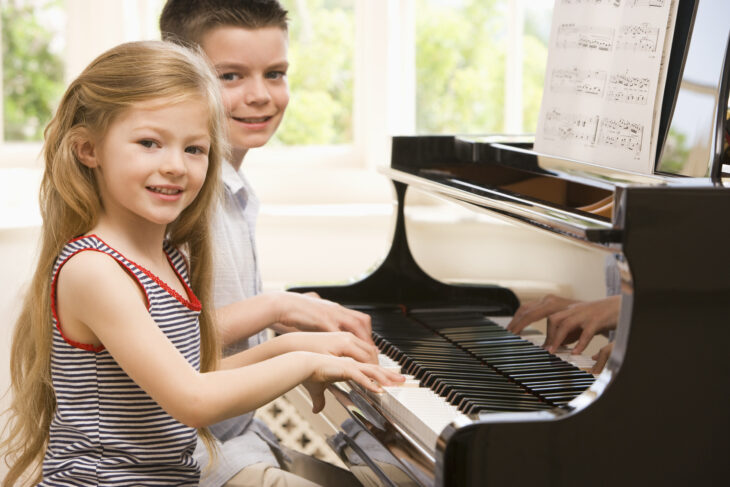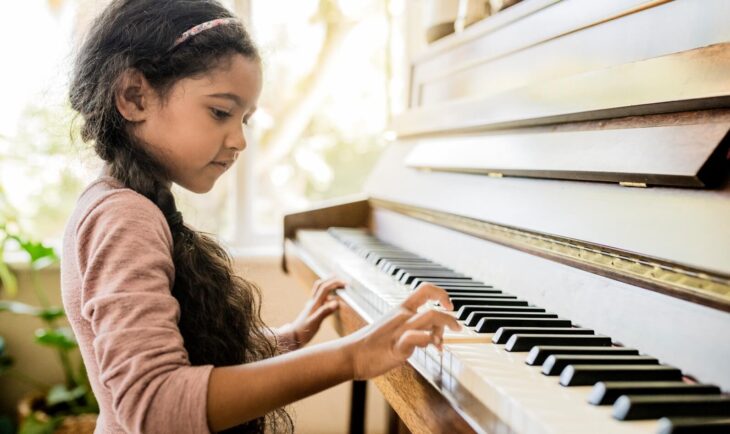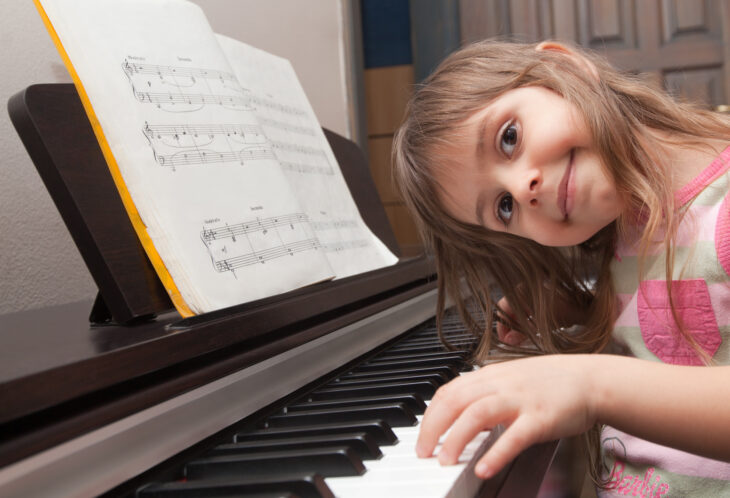Mastering the art of piano planning is quite a challenge at any stage of life, but for little learners, it can be incredibly difficult due to young age peculiarities: kids cannot concentrate properly, they are restless, quickly lose interest in a current task, and need a continuous change of activities.
Still, a child being able to play the piano is truly incredible. An infant phenomenon. Just think of it: piano playing sharpens concentration, teaches persistence, improves self-discipline, helps to develop management skills, enhances emotional intelligence, boosts memory capacity, increases academic performance, and brings a dozen other amazing benefits to a person.
But a child does not always want to learn the piano. A child wants to play toys, get stuck in the smartphone, watch cartoons, and just enjoy a careless, fun-filled childhood without any commitments or duties. How can parents encourage their child to learn piano so that all parties of the process stay happy and sane? Here are a handful of smart tips for parents to motivate their little darling ones to keep on playing the piano.

Source: turnerskeyboards
Contents
Finding an easy-going, dedicated, well-versed piano teacher
If piano lessons are not exciting and engaging, the child will not be stimulated to go on learning. A young student will only progress if the teacher puts their heart and soul into the child, with genuine enthusiasm to impart wonderful knowledge and skills to a beginner pianist.
Surely, your child may grumble at lessons, stating they are long, boring, and difficult. You know, leaving the personal comfort zone is always a bit painful. But if the child complains about a teacher as a person, it is a bad sign that they do not go well with each other.
A piano lesson is fruitful only when the teacher can create a beautiful connection with their mentees, building trust and inspiration in the little ones through special educational games and morale-boosting exercises. No matter how experienced or accomplished a piano teacher is, if they cannot find a good approach to fidgety children, such a teacher is not effective.
A professional teacher for young pianists inspires others with a genuine passion for their job. Such a teacher will never tell the student that “You cannot do it” because a single wrong word can nip a child’s desire to proceed in the bud. The real piano teacher always says a good word for a student’s endeavors and only then points out the weak points. In most cases, the child’s motivation to study entirely depends on the attitude of the teacher.
Having a couple of trial lessons with different teachers is within your course of action when you are picking the right mentor for the novice little musician. Opt for the one that your kid finds great. After all, it is your child who will struggle through the lessons, not you. The child’s opinion must be anyway considered. On the website thebestpianoteachers.com, you can find the best piano teacher who specializes exactly in teaching little students and thoroughly understands how to get on the right side of different children. You can filter the search based on your location, the required qualifications, and the level of your child’s preparation. On this platform, you also can find a proper candidate to conduct piano lessons online which nowadays has become a more preferable format of education.
Come to earth and get realistic about your child’s abilities in music
As mature, businesslike, and hardworking adults, parents often want their children to bring quick and great results, sometimes being too pressing and uncompromising. Parents just forget what it feels to be a little child with limited skills, poorly-developed motivation, and no desire to be pushed. When harnessing the piano prowess, a child must feel supported, not just judged, and criticized. A long road consists of lots of little steps.
To let the child thrive at piano playing, parents need to make the atmosphere surrounding the piano experience utterly relaxed and free of inflated expectations. Set realistic goals for your little pianist according to their age, capabilities, and interests, and be proud of all minor achievements. It is a very normal thing when your small child cannot reproduce a piece of Chopin or Beethoven only after a couple of weeks of training. Mastering piano is a long, labor-intensive process, so have plenty of patience and take joy in every little progression.

Source: verywellfamily
Determine the right time for piano learning practice
Let your kid the freedom and joy to grasp the piano-learning craft at their own pace and prize them for all new milestones cracked. Your child is unique, and the tempo with which he/she learns the ropes of piano-playing may not completely suit your expectations. Yet, celebrate all the little perfections your baby pianist overtakes.
In the beginning, it is reasonable to keep practice sessions short, say 15-20 minutes, but every day. It makes no sense to have longer sessions twice-triply a week because a little pianist cannot stay focused for quite a long time and will get tired in the middle of the process with no benefit reaped from a lesson.
Short-term but regular drill of newly-acquired skills is a key to progress, yet the child will not feel exhausted at the end of a session. Having longer gaps between repetitions is not a way out, since manual dexterity fades extremely quickly if not trained every day – all professional pianists know it. Make piano practice a part of a kid’s daily routine, and he/she will inevitably get used to it like cleaning the teeth or eating fruit.
Learn to play with your child
Piano learning turns into fun if you too practice with your tiny tot. You may adduce arguments here claiming that you are a busy, full-time working parent with a galore of responsibilities and things to do instead of wasting precious time on thumbing the piano. But let’s face it: little kids under 12 can hardly practice piano alone. Therefore, you should consider supervising your child’s practice by attending the lessons of piano learning, too.
However, if you already know how to play the piano, you can, instead of hiring a certified piano teacher, train your child on your own. Use this opportunity to establish closer contact with your kid. This is a great way to spend time together while keeping each other properly motivated and supported.

Source: pbs
Celebrate the progress!
A beginner pianist may be reluctant to get stuck to a new habit of regular piano practice, but little treat can smooth the way to triumph. These treats can be virtually anything, depending on what works better for your baby. From the favorite sweets to extra minutes to spend at a computer/smartphone – you better know what your little darling is fond of yet cannot enjoy to the full.
A proven way to motivate a baby to continue to polish the piano-playing technique is collecting the so-called “points”. Actually, any items can be used as points such as colorful stickers or small toys from chocolate eggs. The goal is to collect a certain amount of points (3, 5, 7, or whatever you decide but remember that the goal must be achievable, and the baby must not lose enthusiasm while reaching it). One point is given for every successfully completed lesson of piano playing. The student may collect these points in a special booklet (if it is stickers) or in a special “box of achievements” if you use tiny toys. Once the desired number of points is collected, the young pianist receives a good, hefty reward like weekends in a huge entertainment center, a hot-air balloon flight, adventure holidays, and other exciting activities your kid has never tried but would love to experience. Providing incentives is an excellent way to motivate your dearest to proceed with piano learning, and he/she will be interested in progressing.
Let the young pianist showcase their progress
Periodic household recitals will help parents to track the progress and teach a beginner pianist not to be afraid of playing in public. These mini-concerts must be full of fun and free of any pressing elements. A learner should understand that it is not heavy duty but a brilliant opportunity to showcase the acquired skills. You can bring your close friends and family members to act as the audience, arrange some snacks for them while they will be enjoying the performance. Once it is over, the guests can give the little player flowers and cute gifts to express their delight and provide encouragement.
When a child knows that he/she will hold a home recital at the end of the month/quarter, such a child is more diligent and meaningful at practicing, yet they get a true feeling of what to expect at the real-world concert. Playing in the circle of the best friends and relatives helps a little pianist better manage their performance anxiety and develop self-confidence – a vital skill no matter what you do in life.

Source: pianopower
Add fun to the process
Since smartphones and tablets have long become an integral part of our existence (and the main source of entertainment/education), why not leverage these technological products to help your honey learn piano? This adds the flair of fun and coolness to the lesson, improving a child’s overall attitude toward practicing. Digital marketplaces abound with all possible apps and games to train piano in an uncomplicated way. Robust piano-learning apps provide a cool interactive environment where through traditional clicking, tapping, and swiping, a child learns the piano basics step-by-step from reading the notes and training the major finger movements to master the play with both hands.
A strong piano mastership requires months and even years to develop, and if your child is happy with their teacher and willing to keep on learning, it is a serious matter for pride. But you should realize that the road to success is long indeed. Harnessing piano is a very important and meaningful experience in the child’s life, but it does take much effort, time commitment, and patience from parents, the student, and the teacher. When you know the little tips on how to stimulate your kid practicing piano, the whole process of learning turns into a more relaxed and fruitful process.
